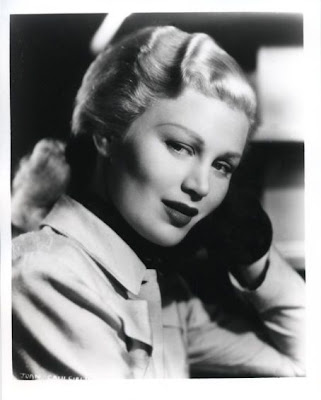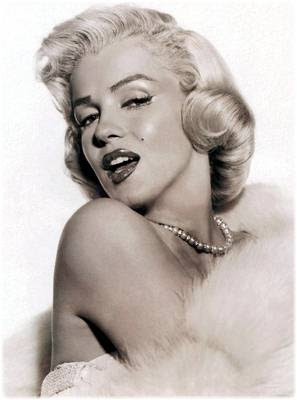 Jayne Mansfield
Jayne Mansfield Mamie Van Doren
Mamie Van Doren Rita Hayworth
Rita Hayworth Lana Turner
Lana Turner Alice Faye
Alice Faye Jean Harlow
Jean Harlow Joan Caulfield
Joan Caulfield Evelyn Keyes
Evelyn Keyes Lucille Ball
Lucille Ball Veronica Lake
Veronica Lake Ann Sothern
Ann Sothern Betty Grable
Betty Grable Claire Trevor
Claire Trevor Mary Beth Hughes
Mary Beth Hughes Carole Landis
Carole Landis Audrey Totter
Audrey Totter Marilyn Monroe
Marilyn Monroe Marie Wilson
Marie Wilson THE IMAGINARY BLONDE ©1953 by Ross MacDonald
THE IMAGINARY BLONDE ©1953 by Ross MacDonaldI backed away from her righteous indignation: female indignation is always righteous, and went out to my car. The early spring sun was dazzling. Beyond the freeway and the drifted sugary dunes, the bay was Prussian blue. The road cut inland across the base of the peninsula and returned to the sea a few miles north of the town. Here a wide blacktop parking space shelved off to the left of the highway, overlooking the white beach and whiter breakers. Signs at each end of the turnout stated that this was a County Park, No Beach Fires. It was a long black Cadillac nosed into the cable fence at the edge of the beach. I braked and turned off the highway and got out. There was no registration on the steeringpost, and nothing in the glove-compartment but a half-empty box of shells for a .38 automatic. The ignition was still turned on. I untied the slip, which didn't look as if it would take fingerprints, and went over it for a label. It had one: Gretchen, Palm Springs. It occurred to me that it was Saturday morning and that I'd gone all winter without a weekend in the desert. I retied the slip the way I'd found it, and drove back to the Siesta Motel.
Ella's welcome was a few degrees colder than absolute zero. "Well!" She glared down her pretty rabbit nose at me. "I thought we were rid of you." "So did I. But, I just couldn't tear myself away." She gave me a peculiar look, neither hard nor soft, but mixed. Her hand went to her hair, then reached for a registration card. "I suppose if you want to rent a room, I can't stop you. Only please don't imagine you're making an impression on me. You're not. You leave me cold, mister.' "Archer," I said. "Lew Archer. Don't bother with the card. I came back to use your phone."
I made a snap decision, the kind you live to regret. "All right. I'll take a fifty-dollar advance. Which is a good deal less than five hundred. My first advice to you is to tell the police everything you know. Provided that you're innocent." Palm Springs is still a one-horse town, but the horse is a Palomino with silver trappings. Most of the girls were Palomino, too. The main street was a cross-section of Hollywood and Vine transported across the desert by some unnatural force and disguised in western costumes which fooled nobody. Not even me. I found Gretchen's lingerie shop in an expensive-looking arcade built around an imitation flagstone patio. In the patio's centre a little fountain gurgled pleasantly, flinging small lariats of spray against the heat. It was late in March, and the season was ending. Most of the shops, including the one I entered, were deserted except for the hired help. It was a small cool shop, faintly perfumed by a legion of vanished dolls. Stockings and robes and other garments were coiled on the glass counters or hung like brilliant treesnakes on display stands along the narrow walls.
"I met a girl," I said. "Actually she was a mature woman, a statuesque blonde to be exact. I picked her up on the beach at Laguna, if you want me to be brutally frank." "I couldn't bear it if you weren't. Married woman, eh? What do you think I am, a lonely hearts club?" Still, she was interested, though she probably didn't believe me. "She mentioned me, is that it? What was her first name?" "Fern." "Unusual name. You say she was a big blonde?" "Magnificently proportioned," I said. "If I had a classical education I'd call her Junoesque."
"Fern Dee. She wasn't a bad little nightingale but she was no pro, Joe, you know? She had it but she couldn't project it. When she warbled the evening died, no matter how hard she tried, I don't wanna be snide." "Where did she lam, Sam, or don't you give a damn?" He smiled like a corpse in a deft mortician's hands. "I heard the boss retired her to private life. Took her home to live with him. That is what I heard. But I don't mix with the big boy socially, so I couldn't say for sure that she's impure. Is it anything to you?" "Something, but she's over twenty-one."
The iron finger, probing my back, directed me down a lightless corridor to a small square office containing a metal desk, a safe, a filing cabinet. It was windowless, lit by fluorescent tubes in the ceiling. Under their pitiless glare, the face above the gun looked more than ever like the dead man's face. I wondered if I had been mistaken about his deadness, or if the desert heat had addled my brain. My mind was still partly absent, wandering underground in the echoing caves. I couldn't recall the voices, or who they were talking about. I had barely sense enough to keep my eyes closed and go on listening. I was lying on my back on a hard surface. The voices were above me.
A sickness assailed me, worse than the sickness induced by Gino's fists. Angel breathed into my face: "Fern Dee is a stage name. Her real name I never learned. She told me one time that if her family knew where she was they would die of shame." He chuckled dryly. "She will not want them to know that she killed a man." I drew away from his charnel-house breath. The building stood on a rise in the open desert. The last rays of the sun washed its walls in purple light and cast long shadows across its barren acreage. It was surrounded by a ten-foot hurricane fence topped with three strands of barbed wire. Palm Springs was a clutter of white stones in the distance, diamonded by an occasional light. The dull red sun was balanced like a glowing cigar-butt on the rim of the hills above the town. A man with a bulky shoulder harness under his brown suede windbreaker drove me towards it. The sun fell out of sight, and darkness gathered like an impalpable ash on the desert, like a column of blue-grey smoke towering into the sky. The sky was blue-black and swarming with stars when I got back to Emerald Bay. A black Cadillac followed me out of Palm Springs. I lost it in the winding streets of Pasadena. So far as I could see, I had lost it for good. The neon Mexican lay peaceful under the stars. The office door was open behind a screen, throwing a barred rectangle of light on the gravel. I stepped into it, and froze. Behind the registration desk in the office, a woman was avidly reading a magazine. Her shoulders and bosom were massive. Her hair was blonde, piled on her head in coroneted braids. She looked me over coldly. "What happened to your face, anyway?" "I had a little plastic surgery done. By an amateur surgeon." She clucked disapprovingly. "If you're looking for a room, we're full up for the night. I don't believe I'd rent you a room even if we weren't." Under her mounds of flesh she had a personality as thin and hard and abrasive as a rasp.
Yellow traffic lights cast wan reflections on the asphalt. Streams of cars went by to the north, to the south. To the west, where the sea lay, a great black emptiness opened under the stars. Ella made a decision. I could tell a mile away what she was going to do. She dropped the gun on the blanket. Her mouth had grown softer. She looked remarkably young and virginal. The faint blue hollows under her eyes were dewy. She was wrong. Something crashed in the kitchen. A cool draft swept the living room. A gun spoke twice, out of sight. Donny fell backwards through the doorway, a piece of brownish paper clutched in his hand. Blood gleamed on his shoulder like a red badge. I stepped behind the cot and pulled the girl down to the floor with me. Ella Salanda ran across the room. She knelt, and cradled Donny's head in her lap. Incredibly, he spoke, in a loud sighing voice: "You won't go away again, Ella? I did what you told me. You promised." "Sure I promised. I won't leave you, Donny. Crazy man. Crazy fool." "You like me better than you used to? Now?" "I like you, Donny. You're the most man there is."
She held the poor insignificant head in her hands. He sighed, and his life came out bright-colored at the mouth. It was Donny who went away. His hand relaxed, and I read the lipstick note she had written him on a piece of porous tissue: "Donny: This man will kill me unless you kill him first. His gun will be in his clothes on the chair beside the bed. Come in and get it at midnight and shoot to kill. Good luck. I'll stay and be your girl if you do this, just like you always wished. Love. Ella." She was rocking his lifeless head against her breast. Donny had his wish and I had mine. I wondered what Ella's was.
* * * *
 Philip Marlowe describing Eileen Wade: "She was slim and quite tall in a white linen tailormade with a black and white polka-dotted scarf around her throat. Her hair was the pale gold of a fairy princess. There was a small hat on it into which the pale gold hair nestled like a bird in its nest. Her eyes were cornflower blue, a rare color, and the lashes were long and almost too pale. She reached the table across the way and was pulling off a white gauntleted glove and the old waiter had the table pulled out in a way no waiter ever will pull a table out for me. She sat down and slipped the gloves under the strap of her bag and thanked him with a smile so gentle, so exquisitely pure, that he was damn near paralyzed by it. She lifted her glance half an inch and I wasn't there any more. But wherever I was I was holding my breath." -"The Long Goodbye" (1953) by Raymond Chandler
Philip Marlowe describing Eileen Wade: "She was slim and quite tall in a white linen tailormade with a black and white polka-dotted scarf around her throat. Her hair was the pale gold of a fairy princess. There was a small hat on it into which the pale gold hair nestled like a bird in its nest. Her eyes were cornflower blue, a rare color, and the lashes were long and almost too pale. She reached the table across the way and was pulling off a white gauntleted glove and the old waiter had the table pulled out in a way no waiter ever will pull a table out for me. She sat down and slipped the gloves under the strap of her bag and thanked him with a smile so gentle, so exquisitely pure, that he was damn near paralyzed by it. She lifted her glance half an inch and I wasn't there any more. But wherever I was I was holding my breath." -"The Long Goodbye" (1953) by Raymond Chandler










































